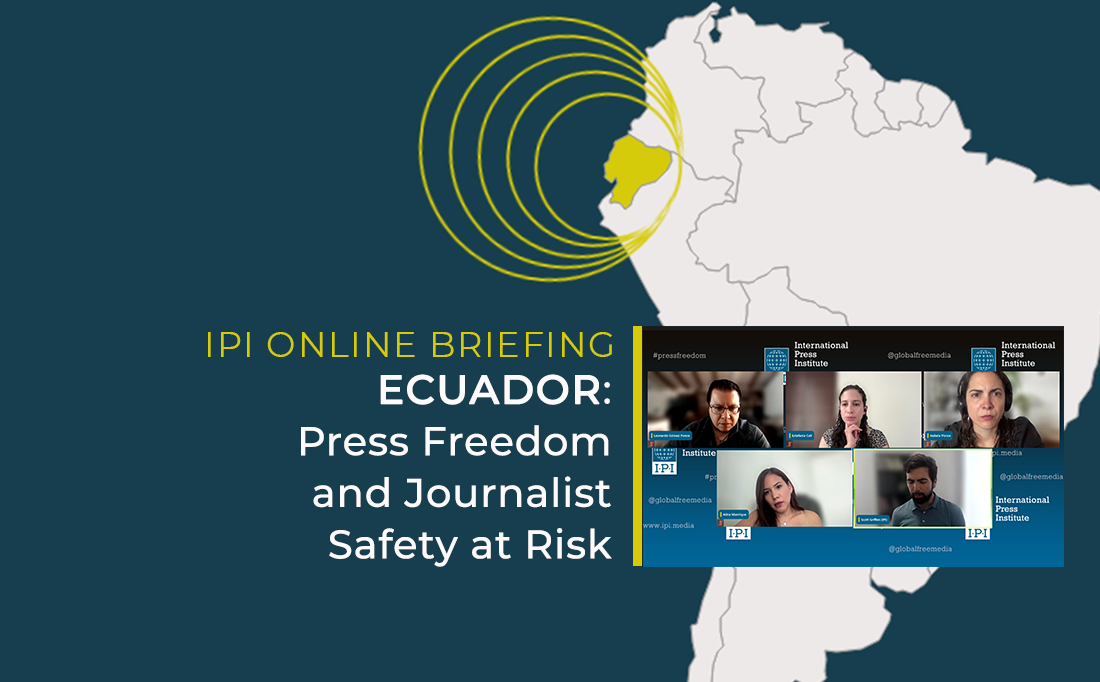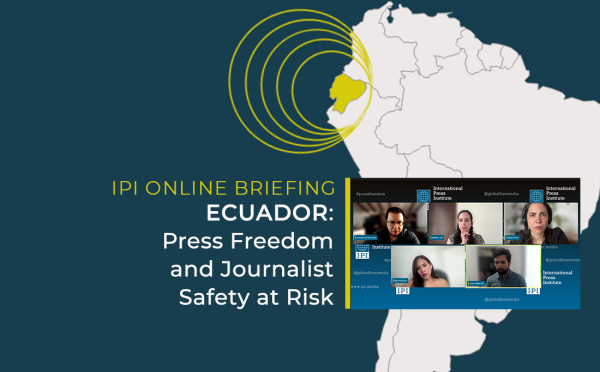A surge in organized crime and drug related violence has created a spiraling journalist-safety crisis in Ecuador. Last month, the International Press Institute (IPI) organized an online briefing with four leading Ecuadorian journalists and editors. Their conclusion: Ecuador’s journalists face threats on multiple fronts and face constant, physical, psychological, digital, and financial risk.
Starting the discussion, Alina Manrique, editor-in-chief at TC Televisión, recounted the shocking attack on her television station during a live broadcast on January 9 in Guayaquil. Masked men broke in waving guns and explosives. Manrique said the incident underscored the safety risks that not only journalists, but all Ecuadorian people face. She suspects that the attack was meant to demonstrate the power of organized crime. “Maybe they wanted to shock us because killing us would have been easy,” Manrique said. “There had been alerts beforehand, but you get used to the threat in Ecuador, so we didn’t take them seriously”
Isabela Ponce, co-founder and chief editorial officer at media outlet GK, stated that the last two years have definitely been the worst years for journalism in Ecuador. “As a team leader, safety is a big responsibility,” she said. “When a threat comes from criminals, it is hard to anticipate what is coming.”
While the attack on TC Televisión earlier this year put all eyes on Ecuador, the safety situation had been deteriorating for several years. According to Estefanía Celi, a journalist and member of the NGO Periodistas Sin Cadenas (“Journalists without Chains”), the turning point came in 2018 when a team from newspaper El Comercio was murdered. Authorities – including the administration of current President Daniel Noboa, elected in 2023 – have provided insufficient support. Crimes against journalists often go unpunished. The safety risk has forced many journalists into exile. The government has a program to help journalists relocate, but it lacks funding.
Journalist Leonardo Gómez Ponce, the director of the investigative journalism unit Tierra de Nadie, said that working in the field in Ecuador is not easy. “You don’t see the violence all the time but you feel it,” he said. Information is hard to access in Ecuador. According to Gómez Ponce, working in smaller places poses an even bigger threat. “Local journalists can’t safely conduct interviews because they are easily recognized”, he said. It’s hard to know who you can trust in Ecuador, he added, because anyone can be connected to organized crime groups. Celi agreed, adding that even government officials and other journalists can have ties to these crime syndicates.
Pressure on press freedom from the government
In addition to the safety risk, panelists said, there’s also pressure on press freedom from the government of President Daniel Noboa, who can target the media when he dislikes coverage he receives. Panelists highlighted two instances: The first came in the beginning of June 2024 when the critical program Los Irreverentes was shut down due to government pressure. The second came on June 25, when authorities revoked the visa of Cuban journalist Alondra Santiago. She had lived in Ecuador for 19 years and had criticized the government. According to Celi, the government is also seeking ways to put pressure on civil societies and NGOs.
Gómez Ponce noted that regular people in Ecuador are willing to give up their freedom for safety amid the violence the country has faced. And with Noboa running for re-election in February, panelists expressed concern about the future for media freedom in Ecuador under a possible second Noboa term.
Call for international support
Journalists in Ecuador are working in difficult conditions and need the help of the international community. Isabela Ponce advocated for creating spaces and events where Ecuadorian journalists can reach global audiences. In addition to that, there is a need for funding. “We need more funding that is not tied to a specific form of help,” she said. Meanwhile, Manrique added that if organizations don’t have resources to help with funding, assistance with safety protocols would be welcome.


